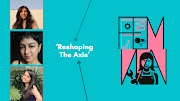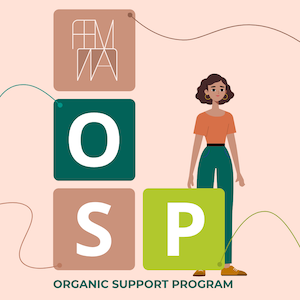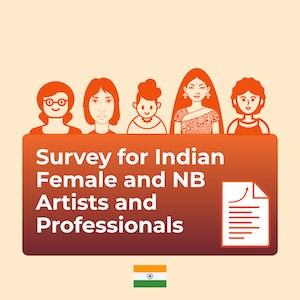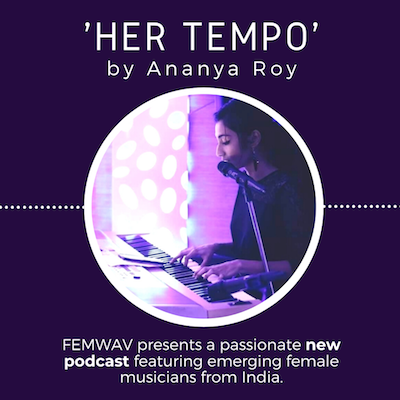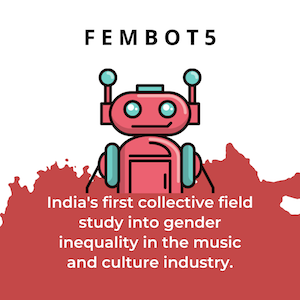Synthfarm 2019 sees a 65% increase in female participants.
Since its inception in 2017, the Fembot5 raison d'être has remained unchanged: To highlight the immensely skewed gender ratio in the Indian electronic music scene and factors that run causal interference in this regard. From plain old dismissal of female participants with accusations of creative inauthenticity and of perusing "sexuality and superficiality" -- as if either is gender-specific -- to outright sexual harrassment and objectification, female electronic musicians or enthusiasts in India face numerous roadblocks in addition to issues deeply rooted in sexism that already plague women in India everywhere. |
| Synthfarm 2019 crew |
Fixing this disparity is going to require an elemental shift in educational attitudes and systemic changes that seem nowhere in sight, but tracking incremental achievements and celebrating them is going to be key in keeping apocalyptic doses of anxiety at bay - especially if any progress is to be made.
To wit, the number of female participants went up by 65% in this year's edition of Synthfarm, February 1-3, 2019, creating inroads for interested but hitherto unaware women.
It is easy to focus on how this increase is indicative of dismal numbers in Synthfarm's previous editions, as is usually the case with most electronic music communities and workshops in India. However, let's take a moment to review how this growth in numbers will directly contribute to participatory growth in the future.
 |
| A Syntfarm 2019 participant engrossed in the process |
In 2015, Samrat B, Varun Desai, and Lionel Dentan - all key figures in Indian electronic music - put together the first edition of Synthfarm in Kolkata to facilitate hands-on literacy in sound design, modular science, and electronic music. For some time, the curators, contributors, and participants were all male and this did not seem to be changing swiftly. Even in the arguable electronic music capital of the world Berlin, this transformation of the scene and inclusion of women has been slow to come about and is still ongoing in every sense. A pivotal role is this is played by women producers that created agencies, labels, and activism networks that supported other women, visibly and vocally.
Committing publicly is step one to pledging support for marginalised voices, and it was in this vein that Synthfarm launched its Empowerment of Female Talent program, offering two scholarships to female participants that covers 100% cost of participation and return-flights. Registration to apply for a scholarship, or to simply enrol is available here. There is absolutely no need of pre-existing synth exploration mandatory.
From Detroit and now residing in Bengaluru, Synthfarm's Empowerment of Female Talent scholarship 2019 recipient, talks about post-industrial sounds and her experience at Synthfarm
There is a certain degree of seriousness that accompanies synth-making, tying cleanly in with the pressure mounted on artists to not just be good, but intelligent in a very didactic sense of the word. These expectations multiply exponentially when it comes to female artists, and any sign of levity or of not following the script can give way to Homerian struggles where they are targeted by whispered innuendo alluding to their lack of skill or outright disrespect. The common inference is that their gender somehow inhibits their abilities, all this in spite of the most innovative electronic music artists canonically being female (see: Delia Derbyshire, Daphne Oram). In every aspect, women must play up being a man to command respect.
It is this general attitude along with the immense amount of unnecessary mythology surrounding modular synthesizers that can put any curious onlookers off, lest they be at the receiving end of florid embarrassment.
"I felt conceptually I am able to understand more stuff with these kind of presentations which explain things from ground-up" - Kalpa Viswanadhan, participant Synthfarm 2019Women sidestepping the gatekeepers and experiencing synth-making firsthand is crucial to dispel (or humanise) some of these myths and generating a critical mass of women in electronic music. That, and a sympathetic ecosystem for 'outsiders'. It is impressive that Synthfarm is devoted itself to increased female representation which may pave way for other similar institutions to follow suit, and maybe one day make inclusion riders a norm. More on this later.
Synthfarm 2020 dates are to be announced shortly in May 2019 and detailed coverage of this year's program can be found here. Until then, here is a decent (although not without its issues) introductory 40-year audio retrospective of women in electronic music. To become a Synthfarm partner, download the Synthfarm Funding proposal here.
Written by Uvika Wahi











